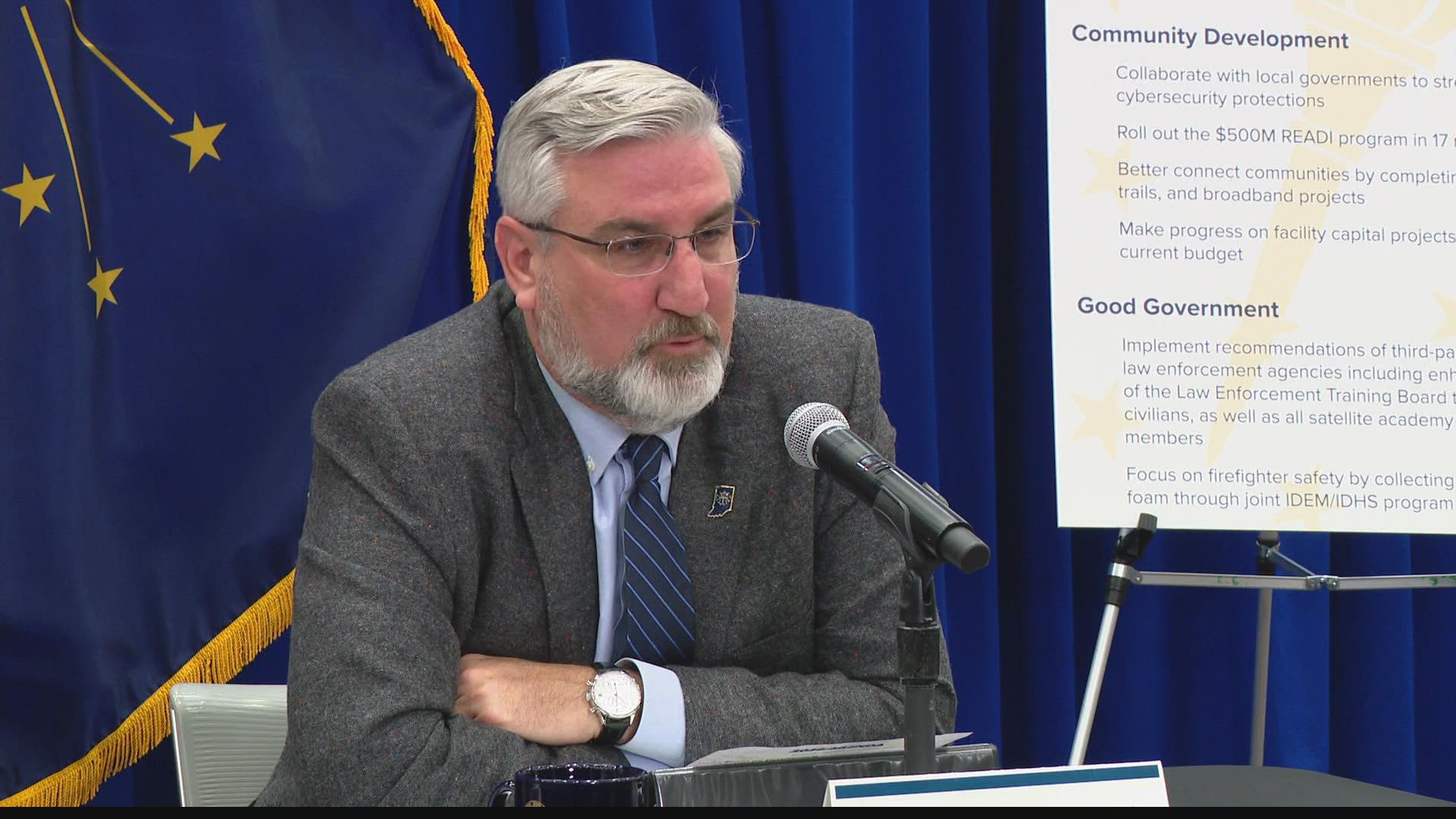INDIANAPOLIS — Governor Eric Holcomb said he’s focused on five pillars of priorities for the upcoming legislative session. At the top of his list is economic development, including tax cuts for businesses and refunds for Hoosiers.
Holcomb wants lawmakers to eliminate the 30% business personal property tax floor on new equipment. He also wants the legislature to update state law so 900,000 more Hoosiers get an automatic taxpayer refund. That move is a response to the state reporting billions of dollars in surplus.
Senate President Pro Tem Rodric Bray, R-Martinsville, supports this push, stating, "Our caucus shares the goal of making changes to our taxpayer refund law so more Hoosiers will be eligible for the refund and continuing to make improvements to our workforce development efforts to meet the demand of today's job market."
The rosy forecast of continued surpluses into the future has some lawmakers ready to make even more tax cuts. Holcomb would not say if he supports those efforts.
"If anything, I'm trying to be disciplined about controlling my own appetite to open up the budget in a non-budget year," the governor said. "I want to live within our means and I want to pay our bills in cash."
The governor said workforce development is also a priority, reporting plans to introduce a statewide "teacher supply-and-demand marketplace" that would help out of work teachers find vacancies.
When it comes to health and wellness development, Holcomb discussed growing the mental health workforce and more access to care. He also said reducing infant mortality is also a priority.
Under his community development pillar, the governor said he plans to bring broadband to more communities.
He also praised the $500 million Regional Economic Acceleration and Development Initiative (READI) program. Indiana Democrats pointed that program is funded by the American Rescue Plan, which many Republicans did not support.
"The Indiana Economic Development Corporation calls READI an 'anchor' for the state’s economic future, and Democrats - not Republicans - delivered these investments when it mattered most," said Mike Schmuhl, chairman of the Indiana Democratic Party.
Noticeably not on the governor’s list was COVID.
"I can take a marker and write COVID at the top if you want," he said. "But that's another item that we're doing on a day in, day out basis."
Lawmakers already made ending the governor's public health emergency a top priority. A House committee is set to meet Thursday to tweak HB1001. The legislation would end the state of emergency, but also gut many workplace COVID-19 vaccine mandates.
The legislative session begins Tuesday, Jan. 4 at 1:30 p.m.
Next Level Agenda breakdown
Holcomb's 2022 Next Level Agenda focuses on economic development, education, public health, community development and good government service.
“The 2022 Next Level Agenda builds a foundation for a healthier state,” Gov. Holcomb said. “These priorities will cultivate a more competitive environment to attract new economic development opportunities, establish better access to public health resources and help connect Hoosiers to better employment and training opportunities. Our efforts will advance Indiana’s reputation as a state Hoosiers want to live, work, play, study and stay.”
Here is a breakdown of the five categories that are administrative priorities for Holcomb:
Economic development
Holcomb's administration wants to end the business personal property tax on new equipment and modernize the Indiana Economic Development Corporation toolkit to:
- Create a new funding mechanism to more competitively invest in transformational economic development opportunities
- Provide greater flexibility within our existing economic tax credit incentive programs
- Incentivize and attract more remote worker jobs to Indiana.
Holcomb also plans to collaborate with legislative leaders to make sure more than 900,000 Hoosiers receive the automatic taxpayer refund.
Education, training and workforce development
Holcomb wants to focus on strengthening early learning opportunities to help children prepare for kindergarten. The Department of Education will establish an Office of Kindergarten Readiness to work with the early childhood team at the Family and Social Services Administration and a revised Early Learning Advisory Committee on kindergarten readiness.
A new school performance dashboard called "Indiana Graduates Prepared to Succeed" that will focus on how students are building skills for success beyond the classroom.
DOE is also building a teacher supply-and-demand marketplace to connect educators with job opportunities in Indiana.
The state is also strengthening its data-driven public workforce system to better connect unemployed Hoosiers with employers, jobs and training programs.
Public health and wellness development
The Holcomb administration will work with community partners to create easier access to people in need of mental health services, building awareness and expanding education and growing the workforce in mental health.
The agenda also includes expanding data collection surrounding sudden unexplained infant deaths. The hope is to better understand causes and better support future programming and services.
Community development
A grant program will be developed to strengthen cybersecurity efforts for local governments.
The $500 million READI program calls for continued progress on capital projects that were authorized in the current budget and building better infrastructure to connect communities for future generations by completing roads, trails, broadband and facility projects.
Good government service
Holcomb's administration wants to take action on regulatory and statutory changes recommended by a third-party review of the state’s law enforcement agencies.
Those include:
- Working with legislative leaders to enhance membership of the Law Enforcement Training Board to include more civilians as well as all satellite academy directors as voting members
- Establishing personnel at the Law Enforcement Training Board to expand development and oversight of statewide training and curriculum that includes implicit bias and cultural awareness
- Developing a strategic plan for Indiana State Police to accomplish recruiting and diversity goals
- Modernizing state law enforcement information systems to better track and analyze performance metrics
Holcomb's administration also wants to establish a program that collects and disposes of PFAS, chemicals found in firefighting foam that can have adverse health effects on firefighters.

